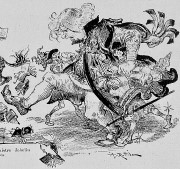|
Home
|
Dec 14, 2023
This week’s themeEponyms This week’s words Gavroche Bechdel test chimerize grangousier lexiphanic 
Illustration: Albert Robida, 1886
A.Word.A.Day
with Anu GargGrangousier or Grandgousier
PRONUNCIATION:
MEANING:
noun: 1. A big eater. 2. A gullible person, one who will swallow anything. ETYMOLOGY:
After Grangousier (in French: Grandgousier), a character who loves good
living, in François Rabelais’s story Gargantua. The name Grangousier is
coined from the French grand gosier (big throat). Earliest documented use:
1580.
NOTES:
The word gullible is from the word gull, one who is easily duped.
It’s not certain where the word gull came from. Perhaps it’s from an
obsolete verb gull (to swallow). Grangousier is a giant with a hearty
appetite. He’s a good king who advocates peace, rather than war and
greed. His son Gargantua
and grandson Pantagruel
have also become eponyms in the English language.
USAGE:
“Jean Renoir was born on Sep 15, 1894 ... his father Auguste Renoir
reacting to the arrival that night of such a Grangousier by exclaiming,
‘What a mouth! A furnace! He’ll have the appetite of a horse!’” Pascal Merigeau; Jean Renoir: A Biography; Running Press; 2017. A THOUGHT FOR TODAY:
In its original literal sense, "moral relativism" is simply moral
complexity. That is, anyone who agrees that stealing a loaf of bread to
feed one's children is not the moral equivalent of, say, shoplifting a
dress for the fun of it, is a relativist of sorts. But in recent years,
conservatives bent on reinstating an essentially religious vocabulary of
absolute good and evil as the only legitimate framework for discussing
social values have redefined "relative" as "arbitrary". -Ellen Jane Willis,
writer (14 Dec 1941-2006)
|
|
Subscriber Services
Awards | Stats | Links | Privacy Policy
Contribute | Advertise
Awards | Stats | Links | Privacy Policy
Contribute | Advertise
© 1994-2025 Wordsmith